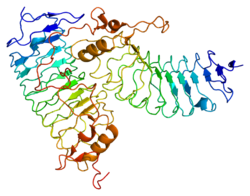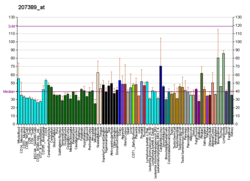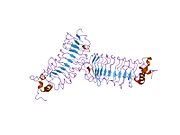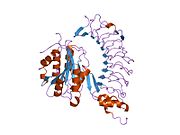Protein-coding gene in the species Homo sapiens
GP1BA Available structures PDB Ortholog search: PDBe RCSB List of PDB id codes 1GWB , 1M0Z , 1M10 , 1OOK , 1P8V , 1P9A , 1QYY , 1SQ0 , 1U0N , 2BP3 , 3P72 , 3PMH , 4C2A , 4C2B , 4CH2 , 4CH8 , 4MGX , 4YR6
Identifiers Aliases GP1BA External IDs OMIM : 606672 ; MGI : 1333744 ; HomoloGene : 143 ; GeneCards : GP1BA ; OMA :GP1BA - orthologs Wikidata
Platelet glycoprotein Ib alpha chain also known as glycoprotein Ib (platelet), alpha polypeptide or CD42b (C luster of D ifferentiation 42b ), is a protein that in humans is encoded by the GP1BA gene .
Function Glycoprotein Ib (GP Ib) is a platelet surface membrane glycoprotein receptor composed of a heterodimer, an alpha chain and a beta chain, that are linked by disulfide bonds.[ 5] von Willebrand factor (VWF). The complete receptor complex includes noncovalent association of the alpha and beta subunits with platelet glycoprotein IX and platelet glycoprotein V to form the glycoprotein Ib-IX-V complex . Binding of the GP Ib-IX-V complex to VWF facilitates initial platelet adhesion to vascular subendothelium after vascular injury,[ 6] [ 7] Bernard–Soulier syndromes and platelet-type von Willebrand disease .[ 8]
Interactions GP1BA has been shown to interact with YWHAZ [ 9] [ 10] [ 11] FLNB .[ 12]
Inhibitors CCP-224, a short PEG-conjugated form of the cyclic peptide OS-1, binds to human GPIb alpha with high affinity and can prevents neutrophil-platelet aggregation in Sickle Cell Disease.[ 13] [ 14] [ 15] [ 16]
See also
References
^ a b c GRCh38: Ensembl release 89: ENSG00000185245 – Ensembl , May 2017^ a b c GRCm38: Ensembl release 89: ENSMUSG00000050675 – Ensembl , May 2017^ "Human PubMed Reference:" . National Center for Biotechnology Information, U.S. National Library of Medicine .^ "Mouse PubMed Reference:" . National Center for Biotechnology Information, U.S. National Library of Medicine .^ Lopez JA, Chung DW, Fujikawa K, Hagen FS, Papayannopoulou T, Roth GJ (August 1987). "Cloning of the alpha chain of human platelet glycoprotein Ib: a transmembrane protein with homology to leucine-rich alpha 2-glycoprotein" . Proceedings of the National Academy of Sciences of the United States of America . 84 (16): 5615– 5619. Bibcode :1987PNAS...84.5615L . doi :10.1073/pnas.84.16.5615 PMC 298913 PMID 3303030 . ^ Arya M, Anvari B, Romo GM, Cruz MA, Dong JF, McIntire LV , et al. (June 2002). "Ultralarge multimers of von Willebrand factor form spontaneous high-strength bonds with the platelet glycoprotein Ib-IX complex: studies using optical tweezers" . Blood . 99 (11): 3971– 3977. doi :10.1182/blood-2001-11-0060 PMID 12010796 . S2CID 24850350 . Retrieved 2023-09-08 . ^ Jackson SP, Nesbitt WS, Kulkarni S (July 2003). "Signaling events underlying thrombus formation" . Journal of Thrombosis and Haemostasis . 1 (7): 1602– 1612. doi :10.1046/j.1538-7836.2003.00267.x PMID 12871297 . S2CID 22088432 . ^ "Entrez Gene: GP1BA glycoprotein Ib (platelet), alpha polypeptide" .^ Calverley DC, Kavanagh TJ, Roth GJ (February 1998). "Human signaling protein 14-3-3zeta interacts with platelet glycoprotein Ib subunits Ibalpha and Ibbeta" . Blood . 91 (4): 1295– 1303. doi :10.1182/blood.V91.4.1295 PMID 9454760 . ^ Du X, Fox JE, Pei S (March 1996). "Identification of a binding sequence for the 14-3-3 protein within the cytoplasmic domain of the adhesion receptor, platelet glycoprotein Ib alpha" . The Journal of Biological Chemistry . 271 (13): 7362– 7367. doi :10.1074/jbc.271.13.7362 PMID 8631758 . ^ Feng S, Christodoulides N, Reséndiz JC, Berndt MC, Kroll MH (January 2000). "Cytoplasmic domains of GpIbalpha and GpIbbeta regulate 14-3-3zeta binding to GpIb/IX/V". Blood . 95 (2): 551– 557. doi :10.1182/blood.V95.2.551 . PMID 10627461 . S2CID 77799615 . ^ Takafuta T, Wu G, Murphy GF, Shapiro SS (July 1998). "Human beta-filamin is a new protein that interacts with the cytoplasmic tail of glycoprotein Ibalpha" . The Journal of Biological Chemistry . 273 (28): 17531– 17538. doi :10.1074/jbc.273.28.17531 PMID 9651345 . ^ Jimenez, Maritza A.; Novelli, Enrico; Shaw, Gray D.; Sundd, Prithu (2017-09-12). "Glycoprotein Ibα inhibitor (CCP-224) prevents neutrophil-platelet aggregation in Sickle Cell Disease" . Blood Advances . 1 (20): 1712– 1716. doi :10.1182/bloodadvances.2017006742 . ISSN 2473-9529 . PMC 5617353 PMID 28966995 . ^ Chen, Jianchung; Zhou, Hairu; Diacovo, Alexander; Zheng, X. Long; Emsley, Jonas; Diacovo, Thomas G. (2014-12-11). "Exploiting the kinetic interplay between GPIbα-VWF binding interfaces to regulate hemostasis and thrombosis" . Blood . 124 (25): 3799– 3807. doi :10.1182/blood-2014-04-569392 . ISSN 1528-0020 . PMC 4263987 PMID 25293780 . ^ Benard, Susan Adam; Smith, Thomas M.; Cunningham, Kristina; Jacob, Jaison; DeSilva, Thamara; Lin, Laura; Shaw, Gray D.; Kriz, Ron; Kelleher, Kerry S. (2008-04-22). "Identification of peptide antagonists to glycoprotein Ibalpha that selectively inhibit von Willebrand factor dependent platelet aggregation" . Biochemistry . 47 (16): 4674– 4682. doi :10.1021/bi702428q . ISSN 0006-2960 . PMID 18363340 . ^ McEwan, Paul A.; Andrews, Robert K.; Emsley, Jonas (2009-11-26). "Glycoprotein Ibalpha inhibitor complex structure reveals a combined steric and allosteric mechanism of von Willebrand factor antagonism" . Blood . 114 (23): 4883– 4885. doi :10.1182/blood-2009-05-224170 . ISSN 1528-0020 . PMID 19726719 .
Further reading
Kunishima S, Kamiya T, Saito H (November 2002). "Genetic abnormalities of Bernard-Soulier syndrome". International Journal of Hematology . 76 (4): 319– 327. doi :10.1007/BF02982690 . PMID 12463594 . S2CID 23635810 . Du X (May 2007). "Signaling and regulation of the platelet glycoprotein Ib-IX-V complex". Current Opinion in Hematology . 14 (3): 262– 269. doi :10.1097/MOH.0b013e3280dce51a . PMID 17414217 . S2CID 39904506 . Clemetson KJ (July 2007). "A short history of platelet glycoprotein Ib complex" . Thrombosis and Haemostasis . 98 (1): 63– 68. doi :10.1160/th07-05-0327 PMID 17597992 . S2CID 958810 . López JA, Ludwig EH, McCarthy BJ (May 1992). "Polymorphism of human glycoprotein Ib alpha results from a variable number of tandem repeats of a 13-amino acid sequence in the mucin-like macroglycopeptide region. Structure/function implications" . The Journal of Biological Chemistry . 267 (14): 10055– 10061. doi :10.1016/S0021-9258(19)50199-5 PMID 1577776 . Murata M, Furihata K, Ishida F, Russell SR, Ware J, Ruggeri ZM (June 1992). "Genetic and structural characterization of an amino acid dimorphism in glycoprotein Ib alpha involved in platelet transfusion refractoriness" . Blood . 79 (11): 3086– 3090. doi :10.1182/blood.V79.11.3086.3086 PMID 1586750 . Girma JP, Takahashi Y, Yoshioka A, Diaz J, Meyer D (October 1990). "Ristocetin and botrocetin involve two distinct domains of von Willebrand factor for binding to platelet membrane glycoprotein Ib". Thrombosis and Haemostasis . 64 (2): 326– 332. doi :10.1055/s-0038-1647310 . PMID 1702906 . S2CID 27425464 . Miller JL, Lyle VA, Cunningham D (January 1992). "Mutation of leucine-57 to phenylalanine in a platelet glycoprotein Ib alpha leucine tandem repeat occurring in patients with an autosomal dominant variant of Bernard-Soulier disease" . Blood . 79 (2): 439– 446. doi :10.1182/blood.V79.2.439.439 PMID 1730088 . Modderman PW, Admiraal LG, Sonnenberg A, von dem Borne AE (January 1992). "Glycoproteins V and Ib-IX form a noncovalent complex in the platelet membrane" . The Journal of Biological Chemistry . 267 (1): 364– 369. doi :10.1016/S0021-9258(18)48503-1 PMID 1730602 . Miller JL, Cunningham D, Lyle VA, Finch CN (June 1991). "Mutation in the gene encoding the alpha chain of platelet glycoprotein Ib in platelet-type von Willebrand disease" . Proceedings of the National Academy of Sciences of the United States of America . 88 (11): 4761– 4765. Bibcode :1991PNAS...88.4761M . doi :10.1073/pnas.88.11.4761 PMC 51746 PMID 2052556 . Hess D, Schaller J, Rickli EE, Clemetson KJ (July 1991). "Identification of the disulphide bonds in human platelet glycocalicin" . European Journal of Biochemistry . 199 (2): 389– 393. doi :10.1111/j.1432-1033.1991.tb16135.x PMID 2070794 . Du X, Beutler L, Ruan C, Castaldi PA, Berndt MC (May 1987). "Glycoprotein Ib and glycoprotein IX are fully complexed in the intact platelet membrane" . Blood . 69 (5): 1524– 1527. doi :10.1182/blood.V69.5.1524.1524 PMID 2436691 . Andrews RK, Booth WJ, Gorman JJ, Castaldi PA, Berndt MC (October 1989). "Purification of botrocetin from Bothrops jararaca venom. Analysis of the botrocetin-mediated interaction between von Willebrand factor and the human platelet membrane glycoprotein Ib-IX complex". Biochemistry . 28 (21): 8317– 8326. doi :10.1021/bi00447a009 . PMID 2557900 . Wenger RH, Wicki AN, Kieffer N, Adolph S, Hameister H, Clemetson KJ (December 1989). "The 5' flanking region and chromosomal localization of the gene encoding human platelet membrane glycoprotein Ib alpha". Gene . 85 (2): 517– 524. doi :10.1016/0378-1119(89)90446-0 . PMID 2628181 . Wenger RH, Kieffer N, Wicki AN, Clemetson KJ (October 1988). "Structure of the human blood platelet membrane glycoprotein Ib alpha gene". Biochemical and Biophysical Research Communications . 156 (1): 389– 395. doi :10.1016/S0006-291X(88)80853-2 . PMID 2845978 . Wicki AN, Clemetson KJ (November 1985). "Structure and function of platelet membrane glycoproteins Ib and V. Effects of leukocyte elastase and other proteases on platelets response to von Willebrand factor and thrombin" . European Journal of Biochemistry . 153 (1): 1– 11. doi :10.1111/j.1432-1033.1985.tb09259.x PMID 2933256 . Adelman B, Michelson AD, Greenberg J, Handin RI (December 1986). "Proteolysis of platelet glycoprotein Ib by plasmin is facilitated by plasmin lysine-binding regions" . Blood . 68 (6): 1280– 1284. doi :10.1182/blood.V68.6.1280.1280 PMID 2946332 . Lopez JA, Chung DW, Fujikawa K, Hagen FS, Papayannopoulou T, Roth GJ (August 1987). "Cloning of the alpha chain of human platelet glycoprotein Ib: a transmembrane protein with homology to leucine-rich alpha 2-glycoprotein" . Proceedings of the National Academy of Sciences of the United States of America . 84 (16): 5615– 5619. Bibcode :1987PNAS...84.5615L . doi :10.1073/pnas.84.16.5615 PMC 298913 PMID 3303030 . Lopez JA, Chung DW, Fujikawa K, Hagen FS, Davie EW, Roth GJ (April 1988). "The alpha and beta chains of human platelet glycoprotein Ib are both transmembrane proteins containing a leucine-rich amino acid sequence" . Proceedings of the National Academy of Sciences of the United States of America . 85 (7): 2135– 2139. Bibcode :1988PNAS...85.2135L . doi :10.1073/pnas.85.7.2135 PMC 279943 PMID 3353370 . Titani K, Takio K, Handa M, Ruggeri ZM (August 1987). "Amino acid sequence of the von Willebrand factor-binding domain of platelet membrane glycoprotein Ib" . Proceedings of the National Academy of Sciences of the United States of America . 84 (16): 5610– 5614. Bibcode :1987PNAS...84.5610T . doi :10.1073/pnas.84.16.5610 PMC 298912 PMID 3497398 . Harmon JT, Jamieson GA (October 1986). "The glycocalicin portion of platelet glycoprotein Ib expresses both high and moderate affinity receptor sites for thrombin. A soluble radioreceptor assay for the interaction of thrombin with platelets" . The Journal of Biological Chemistry . 261 (28): 13224– 13229. doi :10.1016/S0021-9258(18)69294-4 PMID 3759960 .
External links
PDB gallery
1gwb : STRUCTURE OF GLYCOPROTEIN 1B
1m0z : Crystal Structure of the von Willebrand Factor Binding Domain of Glycoprotein Ib alpha
1m10 : Crystal structure of the complex of Glycoprotein Ib alpha and the von Willebrand Factor A1 Domain
1ook : Crystal Structure of the Complex of Platelet Receptor GPIb-alpha and Human alpha-Thrombin
1p8v : CRYSTAL STRUCTURE OF THE COMPLEX OF PLATELET RECEPTOR GPIB-ALPHA AND ALPHA-THROMBIN AT 2.6A
1p9a : Crystal Structure of N-Terminal Domain of Human Platelet Receptor Glycoprotein Ib-alpha at 1.7 Angstrom Resolution
1qyy : Crystal Structure of N-Terminal Domain of Human Platelet Receptor Glycoprotein Ib-alpha at 2.8 Angstrom Resolution
1sq0 : Crystal Structure of the Complex of the Wild-type Von Willebrand Factor A1 domain and Glycoprotein Ib alpha at 2.6 Angstrom Resolution
1u0n : The ternary von Willebrand Factor A1-glycoprotein Ibalpha-botrocetin complex
1–50 51–100 101–150 151–200 201–250 251–300 301–350
This article incorporates text from the United States National Library of Medicine , which is in the public domain .















